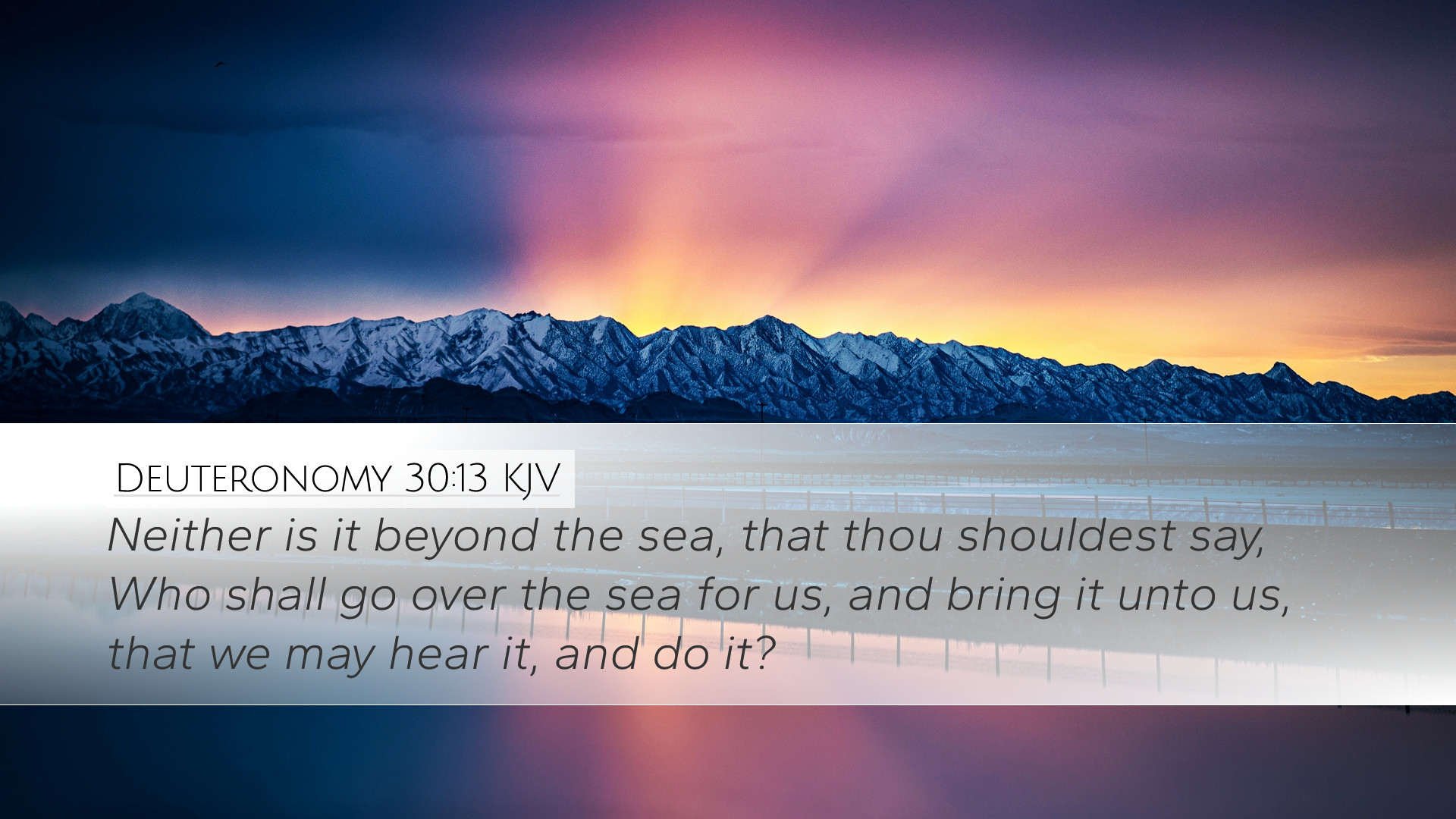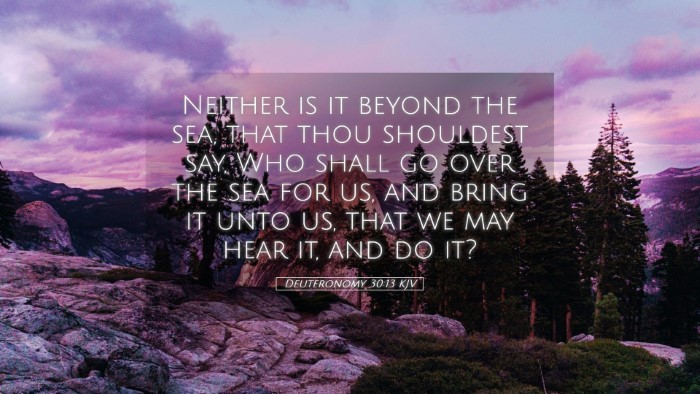Commentary on Deuteronomy 30:13
Deuteronomy 30:13 states: "Neither is it beyond the sea, that you should say, Who shall go over the sea for us, and bring it unto us, that we may hear it, and do it?" This verse serves as a significant reflection on the accessibility of God's law and His commandments to His people. The following commentary draws from the insights of Matthew Henry, Albert Barnes, and Adam Clarke, offering a meditation rich in theological substance and pastoral relevance.
Contextual Understanding
To grasp the essence of this verse, it is crucial to consider its context within the book of Deuteronomy. As Moses addresses the Israelites on the verge of entering the Promised Land, he emphasizes the importance of obedience to God's commands. This verse partakes in a broader exhortation to recognize that God's instructions are not hidden nor too far away. Rather, they are readily accessible, thus not requiring extraordinary measures to grasp or execute.
The Idea of Accessibility
1. Nearness of God's Commandments
Both Henry and Clarke assert that the essence of this verse is to affirm the nearness of God's Word. His commandments are likened to something that should be internalized and acted upon rather than viewed as distant entities:
- Matthew Henry highlights that God’s statutes are presented plainly and are straightforward, emphasizing that believers should not feel the need to find someone to retrieve them from afar.
- Albert Barnes points out that the phrase "beyond the sea" suggests that one cannot plead ignorance or lack of access to God's will, as His commandments are already present.
- Adam Clarke expands this by noting that this accessibility invites individuals to take personal responsibility for their obedience to God's laws.
Exposition of Meritorious Action
2. Responsibility of the Believer
This leads to the next profound insight drawn from the text—the call to personal responsibility:
- Henry emphasizes the active engagement of believers, underscoring that they are called to hear and do, which requires both reception and action.
- Barnes notes that an individual cannot defer this responsibility to another; the relationship with God and the response to His commandments must be personal and immediate.
- Clarke reiterates that individuals should not expect miraculous intercession to deliver knowledge of God’s will, as it is inherently present and requires individual attention.
Theological Implications
3. The Nature of Divine Revelation
This verse also provides valuable insights into the nature of divine revelation:
- Henry posits that God's intentions are clear and available, and His revelation is meant to guide daily living. There is no divine secret that necessitates extraordinary measures to uncover.
- Barnes suggests that this reflects a broader theological truth: God desires communion with His people, and His Word is meant to be a lamp unto their feet and light unto their path (Psalm 119:105).
- Clarke adds depth by explaining that this principle of accessibility undergirds the believer's faith and practice, fostering a relationship built upon understanding and compliance with God's commandments.
Pastoral Reflections
For pastors and spiritual leaders, this verse serves as an encouragement to foster environments where Scripture is accessible and teachings are clear:
- Henry's insights compel pastors to ensure that church teachings communicate the clarity of God's Word, making it understandable and applicable to everyday life.
- Barnes encourages leaders to challenge their congregants to engage directly with the Scriptures, promoting personal study and reflection rather than relying solely on others for spiritual insights.
- Clarke guides pastors to respect the individual's journey, recognizing that while guidance is necessary, the ultimate revelation and response lie within each believer's heart.
Conclusively
In conclusion, Deuteronomy 30:13 is a profound affirmation of the accessibility of God’s commandments, serving as a challenge to believers to engage deeply and personally with Scripture. The combined insights of the public domain commentators underscore the importance of both hearing and doing, reinforcing the notion that divine truth is not concealed but is given so that it might be lived out in the lives of His people. This verse invites serious reflection and action, ultimately fostering a deeper relationship with God through His Word.


